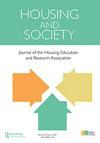Barriers to housing in a grass-roots support group of individuals experiencing housing instability and homelessness
Q2 Social Sciences
引用次数: 1
Abstract
ABSTRACT Secure housing remains unattainable for many experiencing homelessness or housing instability. Research on models like housing first and consumer choice offer options for the chronically homeless, yet evidence shows these models are insufficient for overcoming local community needs. The objective of this study was to use principles of Community-Based Participatory Research (CBPR) to frame the social and structural barriers that prevent many local homeless from finding secure and stable housing. A combination of questionnaire and semi-structured interview formats were used. Seventy-three participants completed questionnaires and 13 interviews were conducted. Participants were predominantly middle-aged, male (90%), and Black or African American (74%). Qualitative analysis yielded four major themes related to chronic homelessness and barriers to secure housing: 1) diverse contributors to homelessness, 2) psychological effects of housing instability that diminish capacity for change, 3) persisting instability despite attainment of housing, and 4) complex interpersonal connections that provide support but also contribute to a network of instability. The personal impact of homelessness coupled with highly nuanced relationships amplified the complexity of targeting supportive measures. The precarious nature of such a network calls for leveraging partnerships with individuals who have experience with homelessness to promote tailored and context-driven interventions.住房障碍是由住房不稳定和无家可归的个人组成的基层支助小组
摘要:对于许多无家可归或住房不稳定的人来说,仍然无法获得安全的住房。对住房优先和消费者选择等模式的研究为长期无家可归者提供了选择,但有证据表明,这些模式不足以满足当地社区的需求。本研究的目的是利用基于社区的参与性研究(CBPR)的原则来界定阻碍许多当地无家可归者找到安全稳定住房的社会和结构障碍。采用问卷调查和半结构化访谈相结合的形式。73名参与者完成了问卷调查,并进行了13次访谈。参与者主要是中年人、男性(90%)和黑人或非裔美国人(74%)。定性分析得出了与长期无家可归和住房保障障碍有关的四个主要主题:1)造成无家可归的因素多种多样;2)住房不稳定的心理影响削弱了变革的能力,以及4)复杂的人际关系提供支持,但也会导致不稳定的网络。无家可归的个人影响加上高度微妙的关系,加剧了针对性支持措施的复杂性。这种网络的不稳定性质要求利用与有无家可归经历的个人的伙伴关系,促进有针对性的、基于背景的干预措施。
本文章由计算机程序翻译,如有差异,请以英文原文为准。
求助全文
约1分钟内获得全文
求助全文
来源期刊

Housing and Society
Social Sciences-Urban Studies
CiteScore
2.30
自引率
0.00%
发文量
10
期刊介绍:
Housing and Society is the journal of the Housing Education and Research Association (HERA). The journal supports the mission of HERA by providing for the dissemination of research and other scholarly work. Submissions from a broad range of perspectives are encouraged. Topics in housing include: policy, design, social aspects, gerontology, behavioral aspects, energy/environment, equipment, interiors, economics, theory/model development, education, and program development or evaluation. The journal welcomes the submission of original research articles, notes and commentaries. Notes are shorter manuscripts presenting succinct information on housing related to one of the following categories: - Research: exploratory or not heavily theory-based or statistically analyzed - Academic: innovative teaching ideas - Program: development, implementation, and/or evaluation of Cooperative Extension or other housing programming efforts - Policy: examination of policy impact, comparative analysis, and/or need to achieve housing goals - Reviews: books, documentaries, etc.
 求助内容:
求助内容: 应助结果提醒方式:
应助结果提醒方式:


